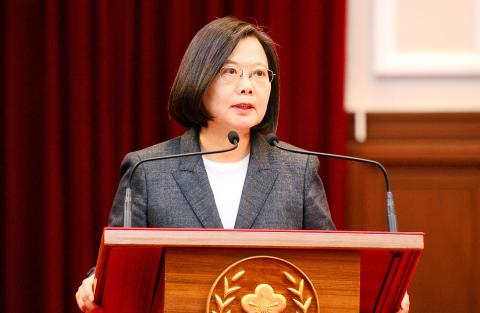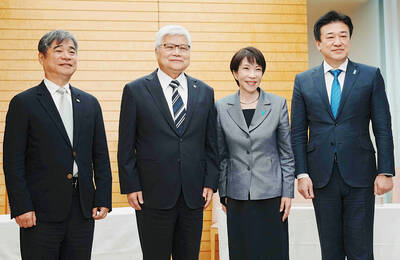President Tsai Ing-wen (蔡英文) yesterday announced that she had suspended preparations for her inauguration ceremony, saying that she would not hold a large assembly amid fears of COVID-19 contagion.
Any further plans regarding the inauguration would be made according to suggestions offered by the Central Epidemic Command Center, she said in a statement on Facebook.
Preventing the spread of the disease is the government’s top priority, Tsai said, adding that the inauguration — scheduled for May 20 — would only be held under certain conditions.

Photo: Wang Yi-sung, Taipei Times
The government would temporarily halt preparations for the event, pending changes in the epidemic situation, she said.
Any event held would be smaller in scale than usual due to concerns over the spread of the disease, she added.
Tsai thanked the Buddhist Compassion Relief Tzu Chi Foundation, the Fo Guang Shan Monastery, Dharma Drum Mountain and other religious organizations for putting large-scale events on hold, or holding them online instead, to mitigate the risk of the disease spreading.
She also thanked members of the various religious groups for their understanding and cooperation at what she called a “crucial moment” in the fight against the spread of COVID-19.
The public’s cooperation has reduced the pressure on frontline disease-prevention officials, she added.
Responding to Taipei Mayor Ko Wen-je’s (柯文哲) remark that Tsai was planning to hold her inauguration at the Taipei Music Center, which is administered by the Taipei City Government, one of Tsai’s aides said on condition of anonymity that the center, which is not scheduled to officially open until June, was among the options.
However, depending on the epidemic situation, the Presidential Office had informed the city government that it could cancel its reservation in favor of another venue, they said.

Right-wing political scientist Laura Fernandez on Sunday won Costa Rica’s presidential election by a landslide, after promising to crack down on rising violence linked to the cocaine trade. Fernandez’s nearest rival, economist Alvaro Ramos, conceded defeat as results showed the ruling party far exceeding the threshold of 40 percent needed to avoid a runoff. With 94 percent of polling stations counted, the political heir of outgoing Costa Rican President Rodrigo Chaves had captured 48.3 percent of the vote compared with Ramos’ 33.4 percent, the Supreme Electoral Tribunal said. As soon as the first results were announced, members of Fernandez’s Sovereign People’s Party

EMERGING FIELDS: The Chinese president said that the two countries would explore cooperation in green technology, the digital economy and artificial intelligence Chinese President Xi Jinping (習近平) yesterday called for an “equal and orderly multipolar world” in the face of “unilateral bullying,” in an apparent jab at the US. Xi was speaking during talks in Beijing with Uruguayan President Yamandu Orsi, the first South American leader to visit China since US special forces captured then-Venezuelan president Nicolas Maduro last month — an operation that Beijing condemned as a violation of sovereignty. Orsi follows a slew of leaders to have visited China seeking to boost ties with the world’s second-largest economy to hedge against US President Donald Trump’s increasingly unpredictable administration. “The international situation is fraught

Taiwan Semiconductor Manufacturing Co (TSMC, 台積電) plans to make advanced 3-nanometer chips in Japan, stepping up its semiconductor manufacturing roadmap in the country in a triumph for Japanese Prime Minister Sanae Takaichi’s technology ambitions. TSMC is to adopt cutting-edge technology for its second wafer fab in Kumamoto, company chairman C.C. Wei (魏哲家) said yesterday. That is an upgrade from an original blueprint to produce 7-nanometer chips by late next year, people familiar with the matter said. TSMC began mass production at its first plant in Japan’s Kumamoto in late 2024. Its second fab, which is still under construction, was originally focused on

GROWING AMBITIONS: The scale and tempo of the operations show that the Strait has become the core theater for China to expand its security interests, the report said Chinese military aircraft incursions around Taiwan have surged nearly 15-fold over the past five years, according to a report released yesterday by the Democratic Progressive Party’s (DPP) Department of China Affairs. Sorties in the Taiwan Strait were previously irregular, totaling 380 in 2020, but have since evolved into routine operations, the report showed. “This demonstrates that the Taiwan Strait has become both the starting point and testing ground for Beijing’s expansionist ambitions,” it said. Driven by military expansionism, China is systematically pursuing actions aimed at altering the regional “status quo,” the department said, adding that Taiwan represents the most critical link in China’s